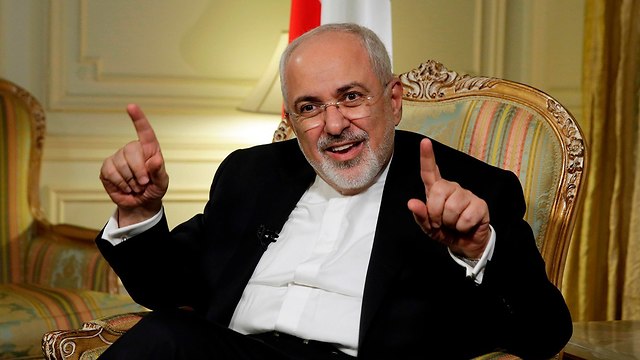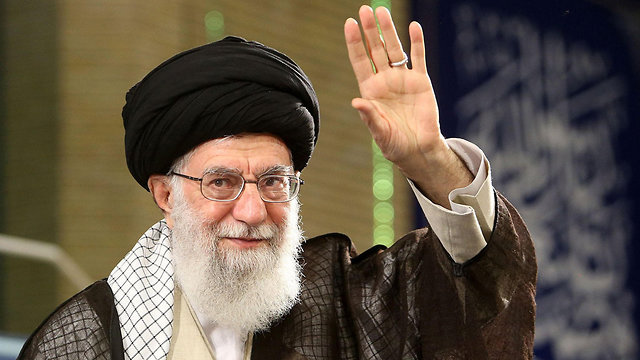

Iran says Europe's offer to save nuclear deal insufficient
In phone call with French and German leaders ahead of Iranian meeting with world powers, President Rouhani says European incentive package designed to salvage crumbling nuclear deal 'does not meet all our demands', according to Iranian news agency; ‘It's unlikely to meet Iranian expectations,’ says EU diplomat.
Iranian President Hassan Rouhani said Thursday that a European offer of economic measures to counter the effects of the United States abandoning the nuclear deal does not go far enough, reported state news agency IRNA.
Rouhani told French President Emmanuel Macron and German Chancellor Angela Merkel in a phone call that the package "does not meet all our demands," reported the news agency on the eve of ministerial talks in Vienna.
The Iranian leader said he hoped the matter could be addressed at the meeting which comes two months after US President Donald Trump walked away from the landmark 2015 agreement.
Since Trump's shock move in May, Washington has warned other countries to end trade and investment in the Islamic republic and stop buying its oil from early November or face punitive measures.
The other signatories — Britain, France, Germany, China and Russia — have vowed to stay in the accord but appear powerless to stop their companies pulling out of Iran for fear of US penalties.
The Vienna meeting will discuss the European package of economic measures that aims to persuade Iran to stick with the deal, a European diplomat said without specifying the measures on offer.
The five powers' top diplomats were due to join Iranian Foreign Minister Mohammad Javad Zarif from 0900 GMT,(5pm Malayisa time) in the Austrian capital, where the accord was signed in 2015.
Iranians have complained that the hoped-for rise in foreign investment and trade after the deal has not materialized.
Since Trump's announcement, Iran's rial currency has fallen, prices have risen and the country has been hit by street protests and strikes.
Rouhani, who signed the nuclear deal, has at times been attacked at home by ultra-conservatives, who have denounced his willingness to talk to the West and accused him of hurting the economy.
Iran wants world powers to present measures guaranteeing oil revenue and investment into the country despite US sanctions when ministers meet on Friday, but European states will fall short of its demands, diplomats said.
"The objective is to save the deal. We've made some progress, including on safeguarding some crude sales, but it's unlikely to meet Iranian expectations. It's also not just about what the Europeans can do, but also how the Chinese, Russians, Indians, others can contribute," said a senior European diplomat.
The pillars of the European Union's strategy are: European Investment Bank lending, a special measure to shield EU companies from US secondary sanctions and a Commission proposal that EU governments make direct money transfers to Iran's central bank to avoid US penalties.
"The Iranians expect the others to say what we are going to do to keep the deal alive. We will have to see if it is going to be good enough for them," an EU source added.
Describing the Friday meeting as important, Iranian officials have said that key for them is to ensure measures that guarantee oil exports do not halt, and that Tehran still has access to the SWIFT international bank payments messaging system.
During a visit to Europe this week President Rouhani warned that Iran could reduce its cooperation with the UN nuclear watchdog having already threatened Trump of the "consequences" of fresh sanctions against Iranian oil sales.
"SWIFT is the key but Iran has to stay in at least until the end of the year to maintain divisions between the EU and US, keep some credibility and try and survive amidst forthcoming sanctions," said Sanam Vakil, Associate Fellow at Chatham House, a London-based international think tank.
While talks are expected to focus purely on the nuclear deal, they come amid increasing rhetoric from the Trump administration, which argues that Iran poses a serious security threat.
An Austria-based Iranian diplomat was among four people arrested on suspicion of plotting an attack on an Iranian opposition group in France last week.
The issue could be a distraction in the Vienna talks. Iran has said it had nothing to do with the plot and has demanded the official be released without delay.
Any confirmation that Iranian authorities were behind the plot could make it politically difficult for European leaders to continue to back the nuclear deal.
AFP and Reuters contributed to this report.


















